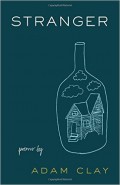
Book Review: Stranger by Adam Clay

Stranger
Poems by Adam Clay
Milkweed Editions, February 2016
ISBN-13: 978-1571314635
$16; 133pp.
Reviewed by Danny Caine
Adam Clay’s Stranger makes good use of its title’s layers of meaning: in an early poem, “Exhibit A,” Clay writes, “I’d like to be stranger than I’ve been.” Later, in the centerpiece long poem, “This is a Frame,” Clay states, “I feel like an unwelcome stranger.” The tension between feeling both strange and like a stranger drives the book. Add unfamiliar places and you get Stranger’s central conflict: being a stranger in stranger land. Especially at the beginning of the book, environments are unsettled in the first poem, “With the sofa / in a slightly different place this morning, / the room resembles a dream of the room.” Later, when the furniture is removed from the house, it becomes even more unfamiliar. In “Sounds of an Emptying House,” a poem that’s both moving and about moving, the speaker muses:
In a house filled with furniture,
it takes little time
to pass through it
at night with your eyes closed.
When the house is empty
for the first time in years,
there’s a stumbling on the first night.
Unfamiliarity, strangeness, transition: this collection is about changes, echoed by the recurring metaphor of seasons changing. Seasons and transitional times provide ample room for Clay to inquire life itself. In “First Winter in Kentucky,” the speaker wonders, “At the turn of the year I don’t know why / but we pause and consider the reasoning / for most everything.”
Indeed, Stranger traffics in the big questions. The speaker in “Honest Attempt,” states, “I suppose this is why / questions exist.” In classic deep-thinker tradition, Clay’s speakers often look to the sky. Clay even pokes fun at this sky-looking, at one point explaining “I’ve heard talk / of the sky today—it exceeds / even disastrous expectations. It’s over-taught, / over-considered.” Yet fear not: Clay’s spare, clear style eliminates reader concern about grand sentiments. For every pronouncement about “most days,” there lurks a clever turn of phrase or sharp metaphor to bring Stranger back to earth. In “Along the Edge of a Season,” “a hallway exists: / hidden between the rooms, / The Iowa of a house.” Still preoccupied with liminality and big questions, Clay deploys a memorable metaphor to relieve the pressure of large-scale questions. A passage from “Sounds of an Emptying House” begins with generality and ends with a sharp image:
Most ways of thinking
about the world exist in past tense and seem less personable
than the desire you once felt
for someone you didn’t know
but wanted to.
To watch Clay maneuver from a grand pronouncement into a poignant image can be thrilling, and it’s an effective way to ask big questions without risking platitude.
The question plaguing this collection the most is perhaps language itself. Stranger revolves around many central metaphors, the house being one. Yet late in the book, the speaker in “This is a Frame” declares, “a house / is such a sullen and inappropriate / metaphor.” Elsewhere, the speaker in “Our Eternal Sounds” wonders, “what thought/resists being built by words?” Stranger’s meditations on language are most meaningful when pulled into the central relationship between speaker and addressee. The speaker in “Along the Edge of a Season” perhaps playfully chastises the addressee’s language: “You said waterlillies / when I’m pretty sure you meant / something else.” Stranger often draws intimacy and warmth from this relationship, and it becomes clear that these two people’s transitions—raising children, moving houses—strain the capabilities of language itself. Note the first person-plural pronouns in “Our Eternal Sounds:” “We don’t know why we speak, / but yet our voices / persist, even when void of substance—.” Though awash in strangeness, Stranger is a love story. The dazzling poem “This Pastoral Way of Living” concludes:
From
one thought to another, I’m calling out to you,
I’m calling out to you,
as if we’re building a nest, one word at a time.
In placing itself along the edge of the seasons of adult life, in its constant questioning of what it means to speak and exist, and in its clean and spare style, Adam Clay’s Stranger is poignant and thoughtful, capable of viewing a transitioning world with curiosity.

Leave a Reply